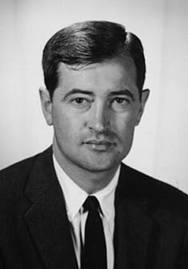Willis Carto facts for kids
Quick facts for kids
Willis Carto
|
|
|---|---|
 |
|
| Born |
Willis Allison Carto
July 17, 1926 Fort Wayne, Indiana, U.S.
|
| Died | October 26, 2015 (aged 89) Virginia, U.S.
|
| Known for | Holocaust denial, antisemitism, right-wing populism, neo-Nazism |
| Title | Head of Liberty Lobby (defunct), founder of the Institute for Historical Review |
| Political party | Populist |
Willis Allison Carto (July 17, 1926 – October 26, 2015) was an American political activist. He described himself as a supporter of Jeffersonian ideas and a populist. However, he was mainly known for spreading conspiracy theories against Jewish people and for Holocaust denial. Holocaust denial is the false belief that the Holocaust, the mass murder of about six million Jews by Nazi Germany during World War II, did not happen.
Carto was involved with several groups, including the Liberty Lobby. He also supported segregation, which means keeping different racial groups separate. He helped create the Populist Party, which was linked to white supremacist groups and members of the Ku Klux Klan. Carto also ran the American Free Press newspaper, which published books and articles with antisemitic and racist views. One of his other projects was the Institute for Historical Review, which promoted Holocaust denial.
Contents
About Willis Carto
His Early Life
Willis Carto was born in Fort Wayne, Indiana. He joined the United States Army and served in the Philippines during World War II. He was injured by an enemy sniper and received the Purple Heart medal. After leaving the military, he studied law for a short time. He then worked for companies like Procter & Gamble and Household Finance Company.
Starting Liberty Lobby
In 1955, Carto started an organization called Liberty Lobby. This group operated under his leadership until 2001. Liberty Lobby published a newspaper called The Spotlight from 1975 to 2001.
After Liberty Lobby faced financial issues, Carto and some of his staff started a new newspaper called American Free Press. This paper continued to publish articles, including some from other writers.
Political Activities in the 1960s and 1970s
Carto created a group called "Youth for George Wallace" to support George Wallace's presidential campaign in 1968. When the campaign ended, Carto changed this group into the National Youth Alliance. He recruited William Luther Pierce to this group. Pierce later became known for writing a controversial book called The Turner Diaries. Carto eventually lost control of the National Youth Alliance to Pierce. Pierce then turned it into the National Alliance, which was a white nationalist organization.
Views on History and the Holocaust
In 1979, Carto founded the Institute for Historical Review (IHR). He also started a publishing company called Noontide Press. This company published books that promoted racialism and denied the Holocaust. One of these books was The Myth of the Six Million, which was one of the first books to claim the Holocaust did not happen.
In 1981, the IHR and Carto were sued by a lawyer representing a Holocaust survivor named Mel Mermelstein. During this case, the court officially stated that "Jews were gassed to death at Auschwitz concentration camp in Poland during the summer of 1944." The court added, "It is simply a fact." The defendants later settled the case, agreeing to pay money and apologize. They also formally admitted that Jews were gassed at Auschwitz and that millions of Jews died in German wartime camps.
After losing control of Noontide Press and the IHR, Carto started another publication called The Barnes Review. This publication also focused on denying the Holocaust.
The Populist Party
In 1984, Carto helped start a new political group called the Populist Party. This party was seen by critics as a way for members of the Ku Klux Klan and other similar groups to run for office.
Some of the Populist Party's presidential candidates included Olympic athlete Bob Richards in 1984, David Duke (a former leader of the Ku Klux Klan) in 1988, and former Green Beret Bo Gritz in 1992. The party stopped operating before the 1996 elections.
Other Activities and Death
Carto's Liberty Lobby also bought a radio network in 1989 to spread his views. He also formed the Foundation to Defend the First Amendment, which was one of several groups he used to support people and organizations with similar beliefs.
In 2004, Carto signed the New Orleans Protocol with David Duke. This agreement aimed to make their shared ideas more accepted by the public. Carto also appeared as a guest on a radio show called The Political Cesspool, which supports "pro-White" views. He spoke at events led by Thomas Robb, a Ku Klux Klan leader.
Willis Carto passed away on October 26, 2015, at the age of 89. He was buried at Arlington National Cemetery because he had earned a Purple Heart during his military service.
His Influences
Willis Carto was greatly influenced by the writings of Francis Parker Yockey. Yockey was a far-right writer who saw Adolf Hitler's Third Reich as a "European Imperium" against both Bolshevism (a form of communism) and the United States, which he believed were controlled by Jewish people. Carto adopted Yockey's book Imperium: The Philosophy of History and Politics as a guide for his own beliefs.
Later, Carto described his own ideas as Jeffersonian and populist. In his 1982 book, Profiles in Populism, he wrote about several American political figures he admired. These included Thomas Jefferson, Andrew Jackson, and Henry Ford. He also included Catholic priest Father Charles Coughlin, who used radio to support the policies of Adolf Hitler and Benito Mussolini.
Publications
- Profiles in Populism (as editor). Old Greenwich, CT: Flag Press (1982) ISBN: 978-0815965183.
- Afterword to Best Witness: The Mermelstein Affair, by Michael C. Piper. America First Books. Washington: Center for Historical Review (1994).
- Populism vs. Plutocracy: The Universal Struggle (as editor). Liberty Lobby.
 | Misty Copeland |
 | Raven Wilkinson |
 | Debra Austin |
 | Aesha Ash |

